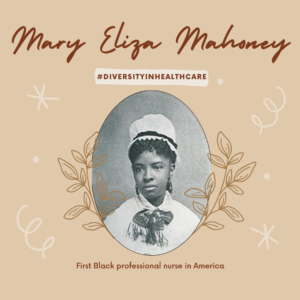
Mary Eliza Mahoney was the first African American woman to complete nurse’s training in the United States, and an active organizer among African American nurses.
 Born in Boston in 1845 to freed slaves, Mahoney knew early on that she wanted to become a nurse; however, Black women in the 19th century often had a difficult time becoming trained and licensed nurses. Nursing schools in the South rejected applications from African American women, whereas in the North, though the opportunity was still severely limited, African Americans had a greater chance at acceptance into training and graduate programs.
Born in Boston in 1845 to freed slaves, Mahoney knew early on that she wanted to become a nurse; however, Black women in the 19th century often had a difficult time becoming trained and licensed nurses. Nursing schools in the South rejected applications from African American women, whereas in the North, though the opportunity was still severely limited, African Americans had a greater chance at acceptance into training and graduate programs.
At the age of 18, she decided to pursue a career in nursing, working at the New England Hospital for Women and Children. The NEHWC became the first institution to offer a program allowing women to work towards entering the healthcare industry, which was predominantly led by men. Despite the NEHWC’s progressiveness, Mahoney worked there as a cook, maid, and washerwoman for 15 years before she was admitted as a student.
In 1878, at age 33, she was accepted in that hospital’s nursing school, the first professional nursing program in the country. Mahoney graduated in 1879 as a registered nurse. Out of a class of 42 students, she and three white women were the only ones to receive their degree – the first Black woman to do so in the United States.
After receiving her nursing diploma, Mahoney worked for many years as a private care nurse, earning a distinguished reputation. She worked for predominantly white, wealthy families and the majority of her work was with new mothers and newborns. Families who employed Mahoney praised her efficiency in her nursing profession. Mahoney’s professionalism helped raise the status and standards of all nurses, especially minorities. During the early years of her employment, African American nurses were often treated as if they were household servants rather than professionals. Mahoney refused to take her meals with household staff to further dismiss the relation between the professions. As Mahoney’s reputation quickly spread, she received private-duty nursing requests from patients in states in the north and along the south east coast.
In 1896 Mahoney became one of the first black members of the organization that later became the American Nurses Association (ANA). When that later organization proved slow to admit black nurses, Mahoney strongly supported the establishment of the National Association of Colored Graduate Nurses (N.A.C.G.N.), and delivered the welcome address at that organization’s first annual convention, in 1909. In her speech, she recognized the inequalities in her nursing education, and in nursing education of the day. The NACGN members gave Mahoney a lifetime membership in the association and a position as the organization’s chaplain.
In retirement, Mahoney was still concerned was deeply concerned with women’s equality and a strong supporter of the movement to gain women the right to vote. When that movement succeeded with the passage of the Nineteenth Amendment in 1920, she was among the first women in Boston to register to vote — at the age of 76.
Mahoney contracted breast cancer in 1923 and died in 1926. In 1936, the N.A.C.G.N. established an award in her honor (later continued by the A.N.A.) to raise the status of black nurses. She was inducted into the A.N.A.’s Hall of Fame in 1976.
Information and photo sources:
https://www.womenshistory.org/education-resources/biographies/mary-mahoney
https://www.pbs.org/wgbh/americanexperience/features/partners-african-american-medical-pioneers/